School building RAAC closures in England and Wales - all you need to know
- Published
- comments
Why are problems with concrete causing schools to close?
More than 100 schools in England and two in Wales have shut buildings made with a certain type of concrete - just days before the start of the new school year.
The Department for Education (DfE) said that any school buildings with RAAC "should no longer be open".
Affected schools are being told to make buildings safe and whist this happens lessons must be moved to temporary classrooms.
In Scotland, 35 schools have been identified to have buildings containing the problem concrete, in Wales, two schools have been closed and schools in Northern Ireland are being checked.
First Minister Humza Yousaf said there was no immediate risk to staff or pupils and that sites will continue to be monitored.
The Children's Commissioner for England Rachel de Souza, whose job it is to look after children's rights, says she's "disappointed and frustrated" that some schools won't be able to fully open this week.
She said the government needs a clear plan to make buildings safe and to make sure children don't miss out on learning time.
Why are school buildings closing?
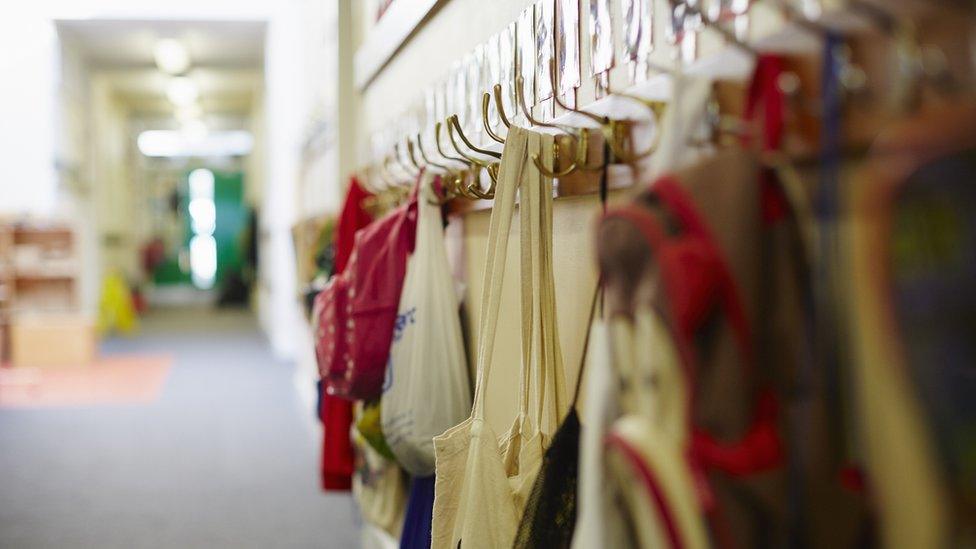
The government has told more than 100 English schools, nurseries and colleges with reinforced autoclaved aerated concrete (RAAC) to close affected buildings immediately until safety measures, such as repairs to strengthen the buildings, are put in place.
Education Secretary Gillian Keegan said the decision followed "new evidence" about the material, and that the government is taking a "cautious approach".
Engineers have been visiting school sites looking for RAAC and over the summer "a couple of cases have given us cause for concern", she said.
What is RAAC?
Reinforced autoclaved aerated concrete or RAAC for short, is a lightweight concrete that was used in roofs, floors and walls between the 1950s and 1990s.
It was cheaper alternative to standard concrete and because it's aerated, or "bubbly", it's not as strong and lasts for limited amount of time of around 30 years.
Some schools - and other buildings like police stations and hospitals - were built during this time and there are concerns that the RAAC found in buildings is too old and may not be safe enough anymore.
How many schools are affected by RAAC concrete problems?
In England the government estimates that at the moment, over 100 schools will be affected but accepts it could be more.
A total of 156 schools have confirmed RAAC. Of those, 52 have already put safety measures in place. The other 104 are putting safety measures in place to stay open.
There are over 20,000 schools in England so at the moment it's a small proportion.
However, hundreds more schools are yet to decide if they have RAAC concrete or not. In June 2023, a report claimed that 572 schools had been identified where RAAC might be present.
In Scotland, 35 schools have been identified to have buildings containing the problem concrete, in Wales, two schools have been closed and schools in Northern Ireland are being checked.
How will I know if my school is affected by RAAC?
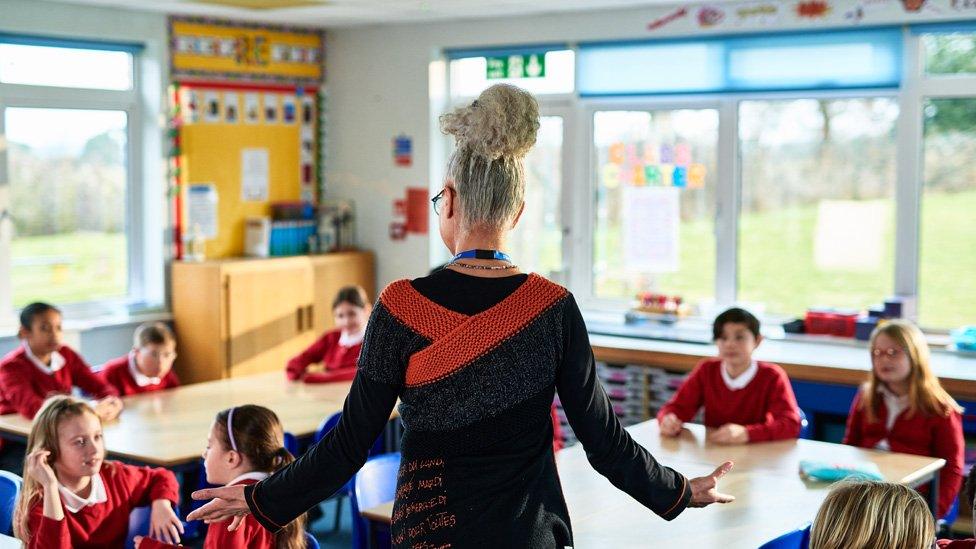
There are more than 20,000 schools, colleges and nurseries in England, so the concerns over RAAC wont won't make any difference to most schools preparing for the start of the new term.
Headteachers from schools that do have RAAC in their buildings will be in touch with parents and guardians to make them aware of the arrangements that are being made before the start of the new school year.
Schools Minister Nick Gibb says the problem could affect more school buildings and head teachers are being sent questionnaires where they are being asked to identify the existence of RAAC in their schools.
Are schools in Scotland, Wales and Northern Ireland affected by RAAC issues?
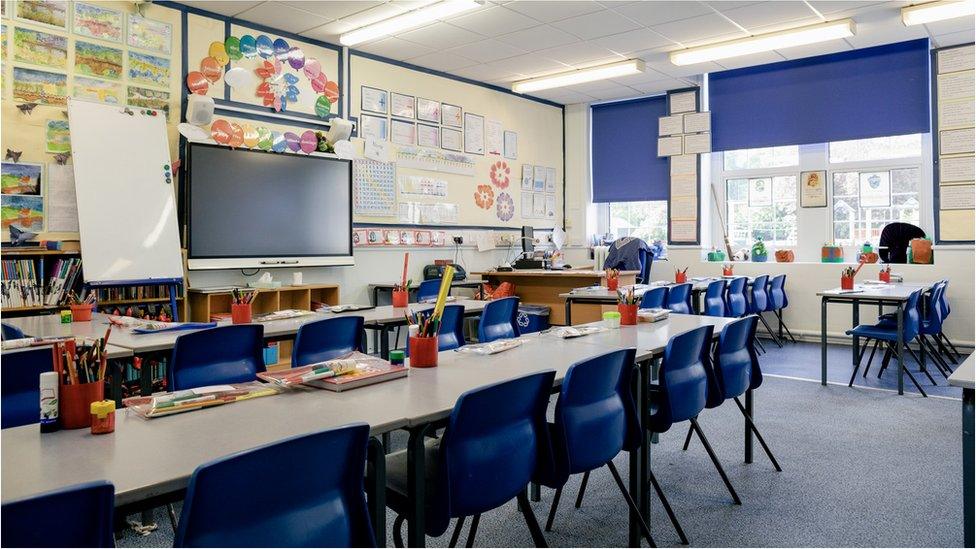
The main news we've heard over the last few days is regarding schools in England, but education is managed separately by politicians elsewhere in the UK.
In Scotland, 35 schools have been identified to have buildings containing the problem concrete and some of those buildings are also closed but others remain open and are checked regularly.
First Minister Humza Yousaf has insisted appropriate safety measures are in place in Scottish schools and there is no immediate risk to pupils or staff.
In Wales, two schools have been closed and schools in Northern Ireland are being checked.
What will happen at the schools that are affected by RAAC?
The Department for Education (DfE) has issued updated guidance for schools with confirmed RAAC in their buildings, saying they should find temporary accommodation for the "first few weeks" of the term, until buildings are made safe.
It recommends finding space in nearby schools or community centres, or an "empty local office building".
Remote education, or home working that was used during the coronavirus pandemic, should only be considered as a "last resort and for a short period", say the DfE.
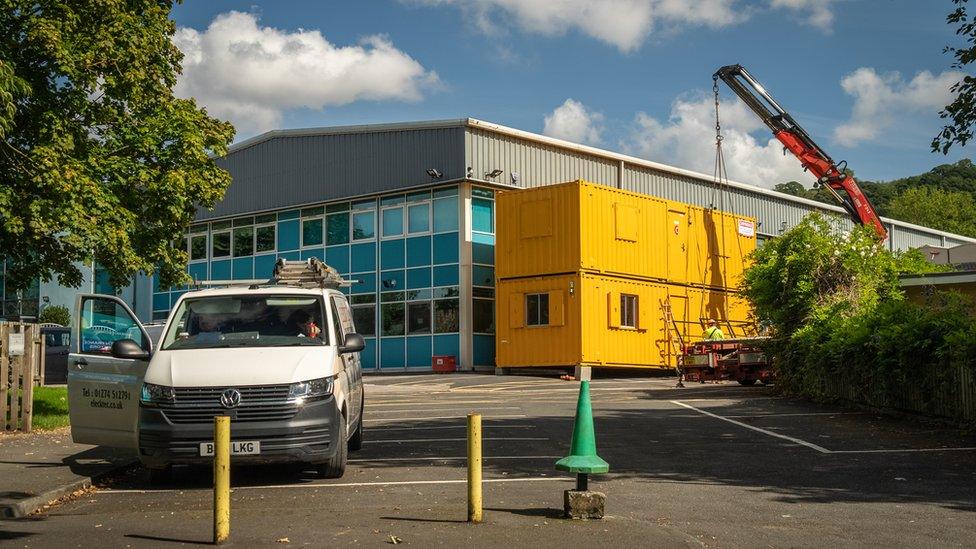
Cross flats Primary in Bradford is among the schools affected
All schools found to contain RAAC will be assigned a dedicated caseworker, who the DfE has said will work with the school to assess what needs to be done.
The government has also said that money will be made available to schools to make buildings safe or to arrange temporary classrooms.
What has the government said about school closures over concrete?
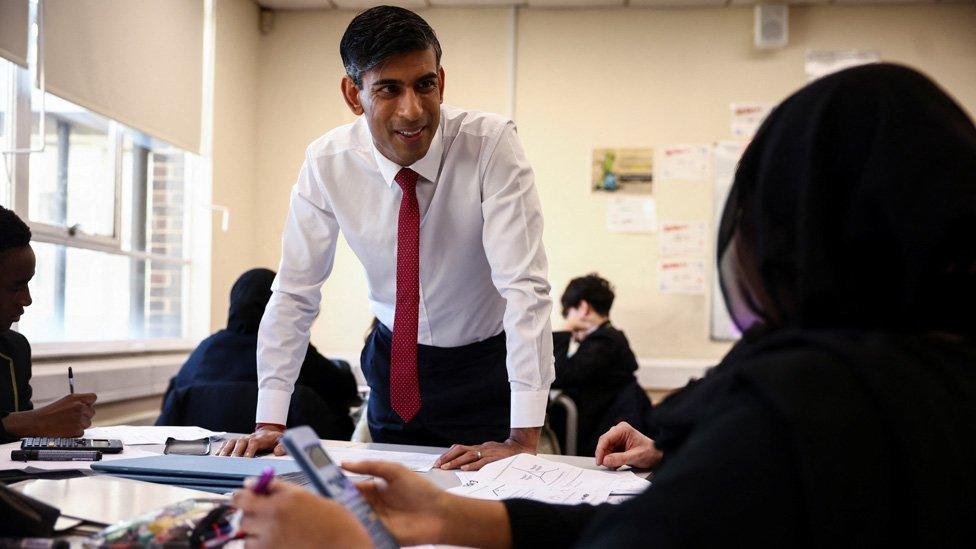
On Sunday, the current chancellor, Jeremy Hunt said the government would spend "what it takes" to make schools safe.
Prime Minister, Rishi Sunak has faced criticism over claims that he cut the budget for rebuilding schools whilst he was Chancellor of the Exchequer - when he was in charge of the country's money.
However the PM says it is "completely and utterly wrong" to blame him for the concrete problem in schools, adding that his budgeting for school refurbishment was completely in line with what was done in the previous decade.
Education Secretary Gillian Keegan is expected to give a statement this week setting out support the government will offer schools.

Gillian Keegan is the education secretary, which means she's in charge of schools and learning
People have criticised Gillian Keegan after finding out she had gone on holiday at the end of August, when kids and teachers were finding out that their schools would be closed. However, she said she did work while she was away, and also said she came back "as soon as I was needed".
She was also criticised for using rude language after an interview with ITV News, which was caught when she didn't know a camera was still recording.
She has since said sorry and said that the rude words were "unnecessary".

When Scottish First Minister Hamza Yousaf was asked why Scotland was not following England in closing more schools, he insisted there was no immediate risk to staff or pupils.
"Of course we'll continue to monitor the sites that do have RAAC but we know for example that appropriate (safety measures) are being put in place," he told BBC Scotland News.
"Parents shouldn't worry - I know as a parent myself who's got children in school - when you see what's happening down south in England, there may be some concern, but there's no need for alarm.
"It is a serious situation but it's one both national and local government are working closely together on."
What do teachers say about RAAC in schools?
Geoff Barton, general secretary of the Association of School and College Leaders (ASCL), said the situation with the concrete was a "national scandal".
He told the BBC headteachers should be focusing on children's learning, rather than trying to identify if their building has RAAC.
Education Secretary Gillian Keegan said earlier this week that the government was waiting on questionnaires sent to schools to see just how widespread RAAC concrete was.
Criticising schools in England that had not yet responded to the survey, she said: "Hopefully all this publicity will make them get off their backsides".
Paul Whiteman, general secretary of the NAHT school leaders' union, said "any attempt to start shifting the blame onto individual schools will be seen by parents and public for what it is: a desperate attempt by government to deflect from its own significant failings".
Daniel Kebede, general secretary of the National Education Union (NEU), said it was "outrageous" of Ms Keegan to "lay any responsibility... at the door of schools", saying the Department for Education (DfE) had been "dragging its heels over many years on this issue".
Why is this situation with RAAC and schools happening now?
The government is being heavily criticised for making this announcement so close to the start of term.
Minsters say it's for safety reasons and while teacher groups and other politicians accept that, they also say the issue was known about before and this current situation is a "shambles".
The government says it has been monitoring the condition of these buildings since 2018.
Up until this point, schools with RAAC were told to have plans in place just in case there was a problem and children had to be moved to a different building.
Now that advice has changed and schools are being told they can't use affected buildings at all unless safety measures are put in place.
Should I be worried about RAAC in my school?
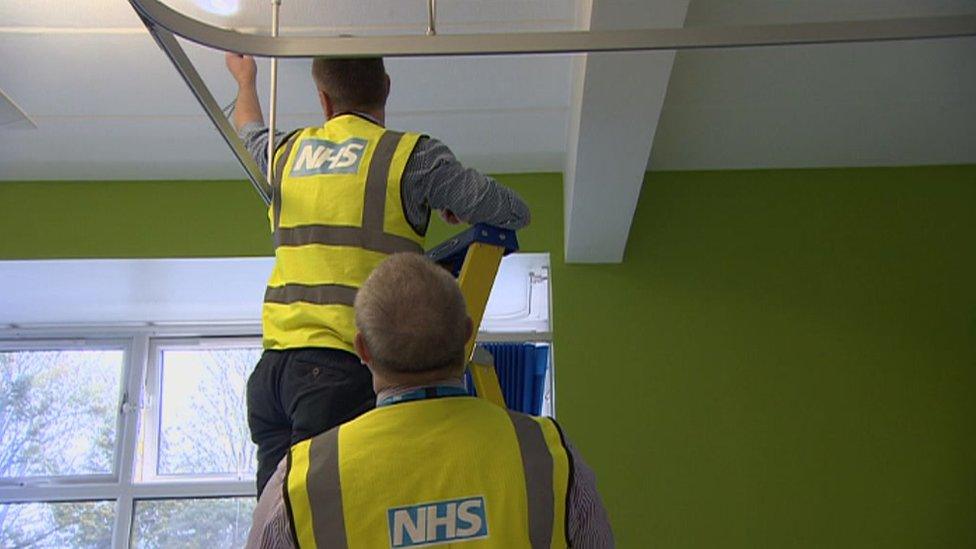
Some hospital buildings have the same concrete issue and will have to be repaired too
The reason that schools are being told to take action is to keep children safe.
If your school is affected, your head teacher will be doing what needs to be done to make the school secure.
But remember the vast majority of schools won't be affected at all.
If you are feeling worried by this story, there's lots of advice here and remember to talk about your feelings to an adult you trust.
